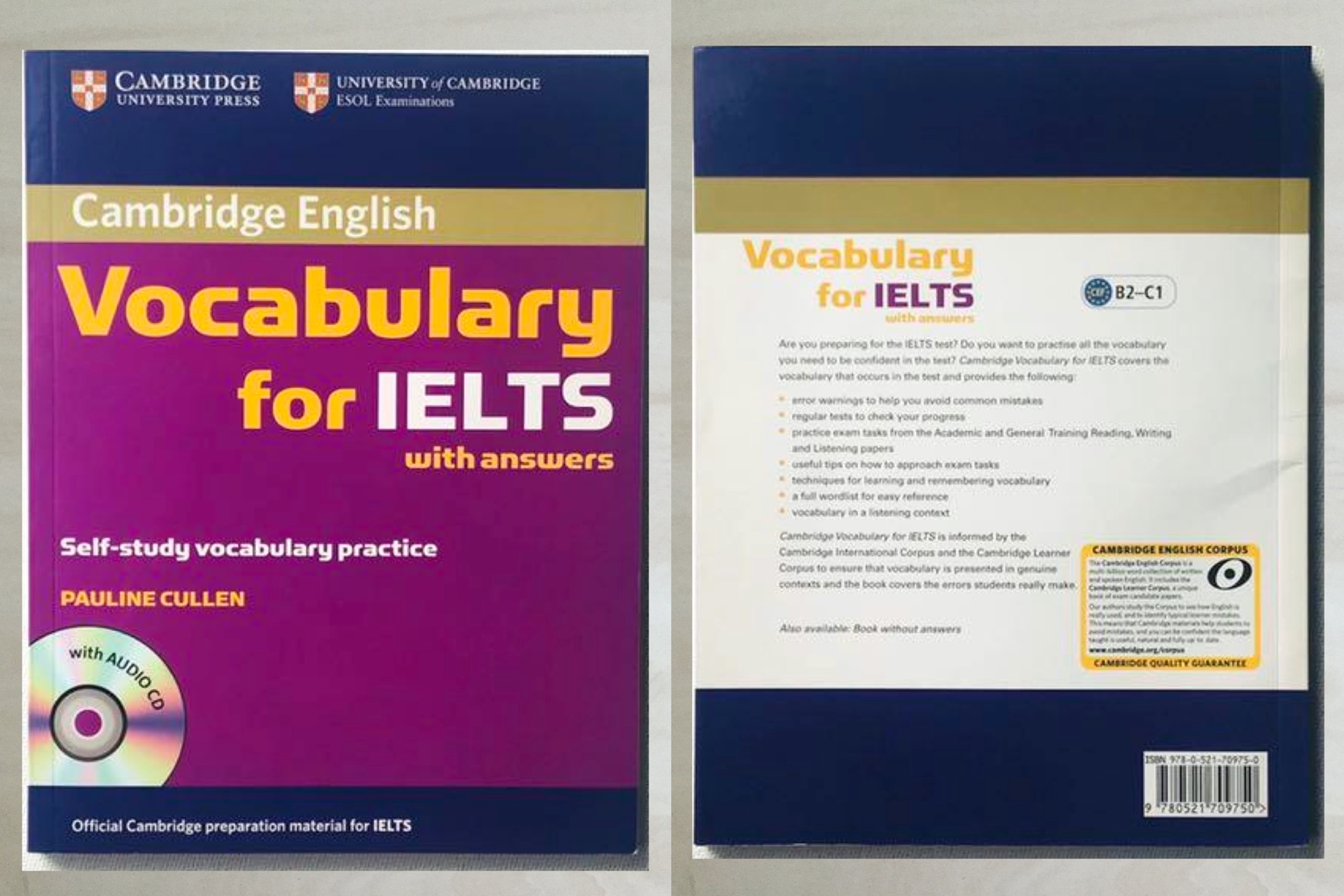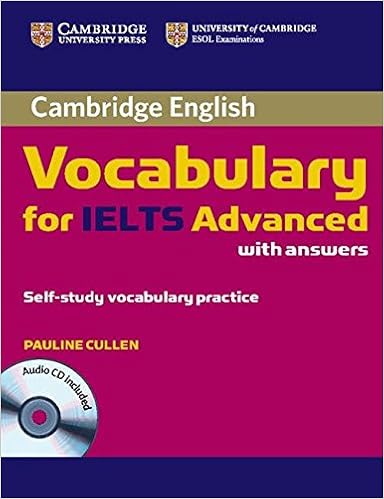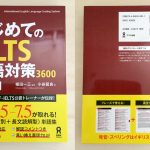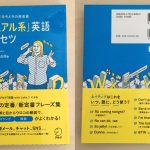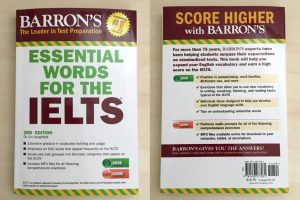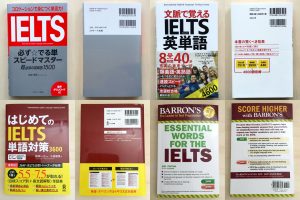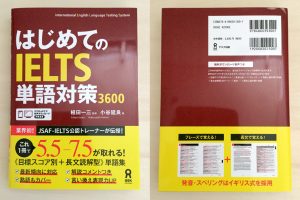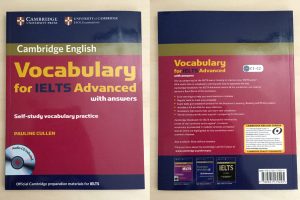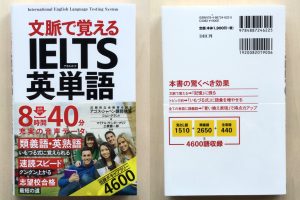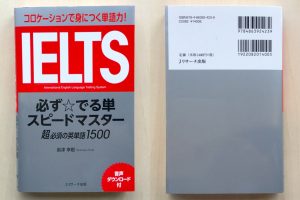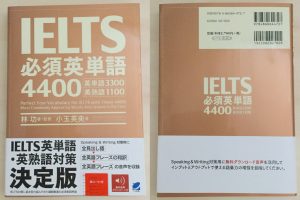ケンブリッジ社のIELTS単語帳基本編
各テーマで英単語は分割されており、さまざまな問題の観点から解くような形で学べます。 また、リーディング、リスニング、ライティングを一緒に学ぶことができるので、語彙だけでなく、全体的なスキルも向上させることができます。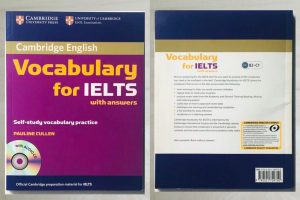
Contents
Map of the book
Introduction
IELTS Test summary
Unit 1 Growing up
Unit 2 Mental and physical development
Unit 3 keeping fit
Unit 4 Lifestyles
Unit 5 Student life
Test One
Unit 6 Effective communication
Unit 7 On the move
Unit 8 Through the ages
Unit 9 The natural world
Unit 10 Reaching for the skies
Test Two
Unit 11 Design and innovation
Unit 12 Information technology
Unit 13 The modern world
Unit 14 Urbanisation
Unit 15 The green revolution
Test Three
Unit 16 The energy crisis
Unit 17 Talking business
Unit 18 The law
Unit 19 The media
Unit 20 The arts Test Four
Unit 21 Language building 1
Unit 22 Language building 2
Unit 23 Academic Writing Task 1
Unit 24 Academic Writing Task 2
Unit 25 General Training Writing Tasks 1 and 2
Test Five
Answer key
Recording scripts
Wordlist
Acknowledgements
CD Tracklist
Map of the book
図1
| Unit number | Title | Topics | Test practice |
| Unit 1 | Growing up | Relationships, families and early learning |
Listening Section 1 |
| Unit 2 | Mental and physical development |
The body, the mind | Speaking Part 2 General Training Writing Task 1 |
| Unit 3 | Keeping fit | Diet, health and exercise | Academic Reading |
| Unit 4 | Lifestyles | Life, leisure | Listening Section 2 |
| Unit 5 | Student life | Study, education, research | General Training Reading Section 2 |
| Unit 6 | Effective communication | Language, linguistics | Academic Reading |
| Unit 7 | On the move | Tourism, travel | General Training Reading Section 1 |
| Unit 8 | Through the ages | Time, history | Listening Section 4 |
| Unit 9 | The natural world | Flora and fauna, agriculture | Academic Reading / General Training Reading Section 3 |
| Unit 10 | Reaching for the skies | Space, tht planets | Listening Section 3 |
| Unit 11 | Design and innovation | Building, engineering | Academic Reading |
| Unit 12 | Information technology | Telecommunications, computers and technology |
Speaking Part 1, 2, 3 |
| Unit 13 | The modern world | Globalisation, changing attitudes and trends |
Academic Writing Task 1 (describing a chart) |
| Unit 14 | Urbanisation | Problems and solutions, big city life |
Academic Reading / General Training Reading Section 3 |
| Unit 15 | The green revolution | The environment, climate change and pollution |
Academic Writing Task 1 (describing a process) |
| Unit 16 | The energy crisis | Natural resources, alternatice fuels |
Academic Reading |
| Unit 17 | Talking business | Employment, management and marketing |
General Training Writing Task 1 Academic Writing Task 2 |
| Unit 18 | The law | Crime, punishment | General Training Writing Task 2 |
| Unit 19 | The media | The news, fame | Academic Writing Task 2 |
| Unit 20 | The arts | Art appreciation, the performing arts |
Academic Reading |
図2
| Reference section | ||
| Unit 21 | Language building 1 | Using a dictionary, word families |
| Unit 22 | Language building 2 | Learning vocabulary, collocation |
| Unit 23 | Academic Writing Task 1 | Data, graphs and tables, diagrams and processes |
| Unit 24 | Academic Writing Task 2 | Linking words, opinion words, register |
| Unit 25 | General Training Writing | Vocabulary for Writing Tasks 1 and 2 |
Introduction
What does the book aim to do?
It aims to extend and improve the accuracy of your vocabulary and help you prepare for the IELTS test. It introduces vocabulary through listening and reading texts that reflect the materials used in the IELTS test. Learning new words in context can help you to remember them and also helps you to understand their meaning. This book also gives you opportunities to practise new words so that they can become part of your active vocabulary.
Who is it aimed at?
The book is designed for students working alone who want to revise and extend their vocabulary. But it can also be used as part of an IELTS preparation course in the classroom, or set as homework by a teacher. It is also suitable for advanced students, or those studying English for academic purposes.
What order should I do the units in?
You can work through the teaching units (1-20) in any order, but you should study all the units if you want to prepare thoroughly for the test. You may want to start with a particular unit because it relates to a topic in your course book or because you have a particular interest in that area. Units 21 and 22 give helpful tips on learning new vocabulary and how to use a dictionary. These units provide a very useful introduction to learning vocabulary, so it may be a good idea to look at these first.
How do I use the book?
It is best to work through a unit from beginning to end as one exercise may revise the vocabulary from a previous exercise. The test practice sections provide further opportunities to extend your vocabulary, as well as giving you practice in the different sections of the IELTS test.
How are the units organised?
There are 25 units. The first 20 units present and practise vocabulary based on general and academic topics. Each topic is divided into smaller sections. Each unit has three pages of vocabulary exercises based on listening, reading, writing and speaking materials similar to those found in the IELTS test. There is also a focus on pronunciation. In addition, each unit has one page for a test practice activity, or three pages when it is academic reading test practice. The test practice includes examples of all the different tasks in the following papers: Academic Reading, General Training Reading, Academic Writing, General Training Writing, Listening and Speaking (see the summary of the Academic and General Training tests on pp6-7). These tasks provide useful practice and revision even if you are not taking the test.
At the front of the book is a summary of what is in each part of the IELTS test. The last five units of the book provide a general guide to learning and using new vocabulary. Units 21 and 22 give useful tips on developing vocabulary and using a dictionary. Units 23 – 25 focus on useful vocabulary for the different writing sections of the IELTS test. Units 23 and 24 are designed for students planning on taking the Academic Training Module and Unit 25 is designed for students planning on taking the General Training Module. At the end of the book you will also find:
・an answer key for each unit including model answers for each writing task
・recording scripts
・wordlists for each unit
What is on the audio CD?
You need to listen to the audio CD to do the listening and pronunciation exercises in each unit. The test practice listening tasks are also on the audio CD. In the IELTS listening test you hear everything once only so try not to replay the track.
How do I use the wordlists?
There is a wordlist for each unit at the back of the book. Some of these words may be specific to one topic area, but many of them can be found and used in a wide variety of contexts. You may want to divide these wordlists up into groups of ten words to learn at a time. It may be a good idea to study the wordlist before you begin each unit. Alternatively your teacher might use the wordlist as a test or review at the end of each unit (or you could ask a friend to do this). You should be able to understand these words when you read or hear them, but you should also try to extend your active vocabulary by using them in your writing and speaking tasks. You should learn the correct spellings of words as well as any words that collocate, or can be used together with them. Use Units 21 and 22 to help you develop good vocabulary learning strategies.
How do I do the writing test practice?
The writing test practice questions give an opportunity to use the vocabulary from the unit. There are sample answers in the answer key. These model answers could be used as a guide to organising ideas and using vocabulary accurately and effectively. You will be penalised if you produce a learnt essay in the IELTS test.
How do I do the speaking test practice?
The speaking test practice questions give an opportunity to use the vocabulary from the unit. In part 2 of the speaking test you will be allowed to make notes, so think of any useful vocabulary you could use and write this down to help you as you talk. If possible, you should record your answers and play them back. Consider your pronunciation as well as the words you used. How could you improve your answer? Ask a friend or a teacher for their comments.
When should I do the vocabulary tests?
There are five tests. Each one tests the vocabulary in five units (Test 1: Units 1-5, Test 2: Units 6-10, Test 3: Units 11-15, Test 4: Units 16-20, Test 5: Units 21-25). When you have finished five units, do the test and mark it. Highlight the questions you got wrong and go back to the units you need to look at again. If you are an advanced student then you may want to take the test before you begin the units to see how much you already know. This may help to pinpoint your weak areas so that you can focus on these in the main units (1-20)
When should I use a dictionary?
The aim of the listening and reading activities in each unit is to give you practice in guessing the meaning from context, so you should try to do each exercise without a dictionary first, unless you are instructed to do so. When you have finished, use the Cambridge Advanced Learner’s Dictionary or another suitable monolingual dictionary to look up any words you don’t know. You can also check your answers in the answer key, but you may want to use your dictionary as a further check. Try to be aware of words that you need to look up more than once. These are obviously key words for you to learn. Write them down with their meanings, together with any example sentences used in the dictionary. A good dictionary will also tell you words that collocate or can be used together with them. It is a good idea to make a note of these as well. Remember that some words have more than one meaning, so check what the unit or exercise is about to make sure you find the correct meaning. Look at Unit 21 if you need more help on how to use a dictionary
How do I learn and revise vocabulary?
Some of the vocabulary in a unit will be new to you and some will be words you are familiar with, but cannot yet use accurately. Even if you feel you know a word, you may be making collocation mistakes and using the incorrect preposition or verb, for example. You might like to use a notebook and organise your vocabulary under the following categories:
・New words to learn
・Words I need to use more
・Words I often make mistakes with
・Topic words (e.g. The Environment; Fuel; Energy:Work etc)
Alternatively, you could simply highlight these words using a different colour highlighter for each category: for example, a blue highlighter for topic words, a red highlighter for words you often make mistakes with, and 50 on. Units 21 and 22 will help you to develop good vocabulary learning techniques.

